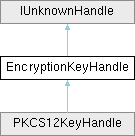Represents encryption key other than password.
More...
Represents encryption key other than password.
- Examples
- decrypt.c, and main.c.
◆ EncryptionKeyInitializeFunction
| typedef void(* EncryptionKeyInitializeFunction) (void) |
Function pointer used to initialize dependencies in order to provide decryption.
This function currently cannot fail. In order to indicate failure on initialization return error code in the decrypt function itself.
- See also
- EncryptionKeyDecryptFunction
◆ EncryptionKeyCleanupFunction
| typedef void(* EncryptionKeyCleanupFunction) (void) |
|
related |
Cleanup all dependencies after the decryption process has finished.
This function is called when the last reference to the EncryptionKeyHandle has been disposed.
◆ EncryptionKeyDecryptFunction
User provided function used for decrypting data.
This function is only called when EncryptionKeyContainsFunction sets the result to true.
- Parameters
-
| data | a pointer to source buffer containing the PKCS#7 encrypted data |
| result | an output pointer which has to be set with the decrypted data on success. Otherwise leave unchanged. |
◆ EncryptionKeyContainsFunction
Function used to determine whether the private key for certificate issued by issuer with serial is present.
- Parameters
-
| issuer | a pointer to X509 NAME structure containning the certificate issuer |
| issuer | a pointer to ASN.1 structure containning the certificate serial |
| result | a pointer to boolean. Set to true, if the private key for issuer and serial is present. Otherwise set to false. |
◆ EncryptionKey_Release()
Decrement the internal reference counter.
When the internal counter reaches zero the object is deleted. Releasing already disposed object causes undefined behavior.
- See also
- IUnknown_Release
The documentation for this class was generated from the following file:



 Public Member Functions inherited from IUnknownHandle
Public Member Functions inherited from IUnknownHandle Related Symbols inherited from IUnknownHandle
Related Symbols inherited from IUnknownHandle